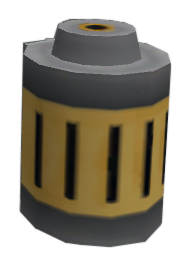Difference between revisions of "Double-C Seismic Accelerometer"
m (→Product description) |
m (→Product description) |
||
| Line 21: | Line 21: | ||
{{Quote | {{Quote | ||
|This device contains an extremely sensitive acceleration sensor, which when properly settled on a firm surface, will detect and record accurate seismic activity data. The accelerometer will still function while flying, so the Double-C can also be used to measure accelerations during flight. Warranty void if shaken or exposed to vacuum. | |This device contains an extremely sensitive acceleration sensor, which when properly settled on a firm surface, will detect and record accurate seismic activity data. The accelerometer will still function while flying, so the Double-C can also be used to measure accelerations during flight. Warranty void if shaken or exposed to vacuum. | ||
| − | | | + | |Probodobodyne Inc.}} |
== Changes == | == Changes == | ||
Revision as of 12:17, 18 October 2016
| Double-C Seismic Accelerometer | ||
| Environmental sensor by Probodobodyne Inc | ||
| Radial size | Radial mounted | |
| Cost | (total) | 6 000.00 |
| Mass | (total) | 0.005 t [1] |
| Drag | 0.2 [1] | |
| Max. Temp. | 1200 K | |
| Impact Tolerance | 8 m/s | |
| Research | | |
| Unlock cost | 8 200 | |
| Since version | 0.18 | |
| Part configuration | sensorAccelerometer.cfg | |
| Experiment | Seismic Scan | |
| Collectable | Yes | |
| Rerunnable | Yes | |
| Resettable | Yes | |
| Electricity required | 0.0075 ⚡/s | |
| Packed volume | 5 l | |
| ||
The Double-C Seismic Accelerometer measures how strongly a craft is accelerating. In career mode, it is available with Electronics, at level 7 of the technology tree.
Currently[outdated], it has "PhysicsSignificance = 1", making it a zero-drag and massless part.
Usage
Attached to the side of an ascent stage this environmental sensor can be used to control your acceleration during launch to provide a better and constant ascent, using less fuel for the same orbit. The Double-C displays 4 significant figures, offering much better precision than the g-meter on the navball. On upper and cruise stages the Double-C Accelerometer can be used to estimate the time needed to accelerate to a certain speed.
Additionally it can be used to measure the spacecraft's current mass indirectly using Newton's second law. To estimate the mass, activate the accelerometer and fire the engines so that the craft isn't rotating.
Given the force F by adding all engines forces together and the acceleration a by the accelerometer the current mass is the division of both. But as the craft is losing mass by this the acceleration is increasing over time. Thus it's only accurate at a low fuel burn rate over a short period of time. This will also change the craft's orbit, so maybe a retroburn afterwards is necessary.
Since version 0.20 this method serves little purpose, because the exact mass of a vehicle can be seen in the map view and tracking station.
While active, the accelerometer drains 0.0075 Electric Charge per second (27 E/h).
Cannot be used(experiment) if the craft is stationary in vacuum.
Product description
| “ | This device contains an extremely sensitive acceleration sensor, which when properly settled on a firm surface, will detect and record accurate seismic activity data. The accelerometer will still function while flying, so the Double-C can also be used to measure accelerations during flight. Warranty void if shaken or exposed to vacuum. — Probodobodyne Inc. |
” |
Changes
- "PhysicsSignificance = 1" added. The part now has 0 mass and drag, despite the listed values.
- Renamed from Double-C Accelerometer to Double-C Seismic Accelerometer
- Added functionality
- Initial release

